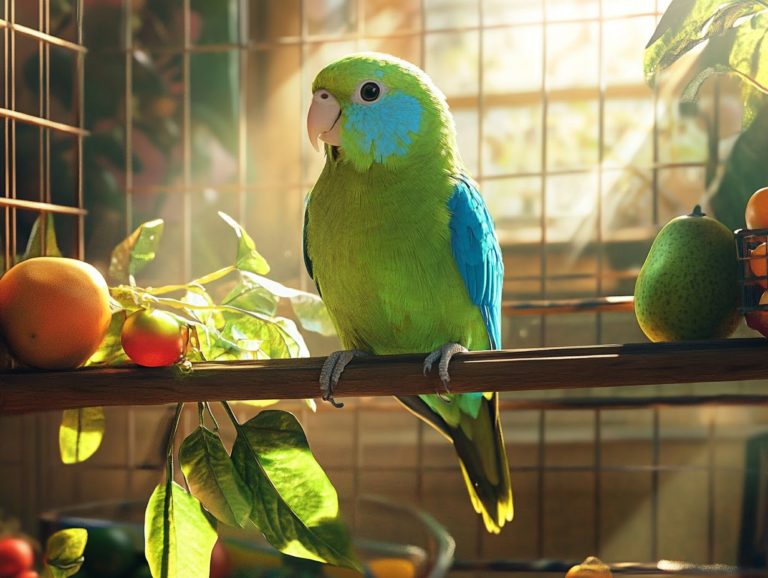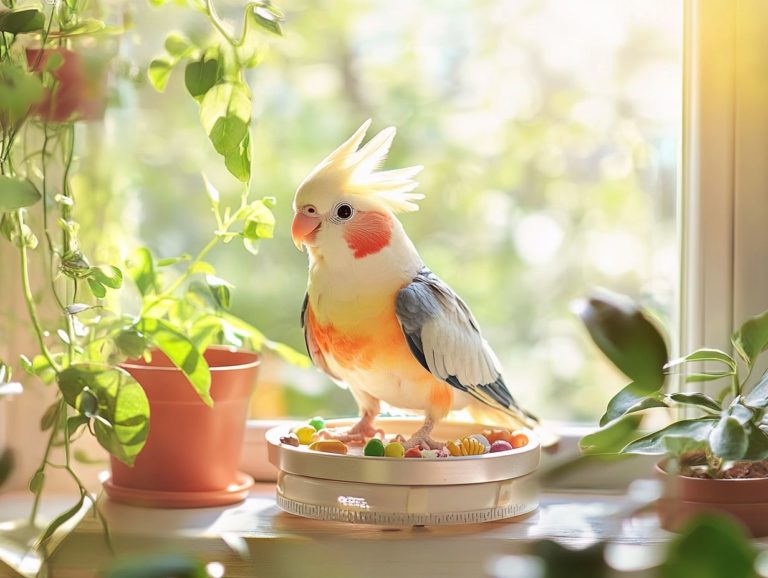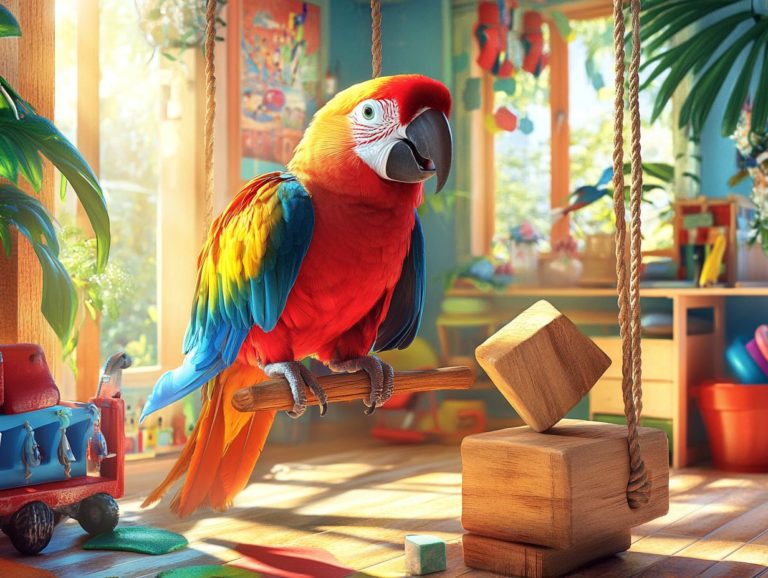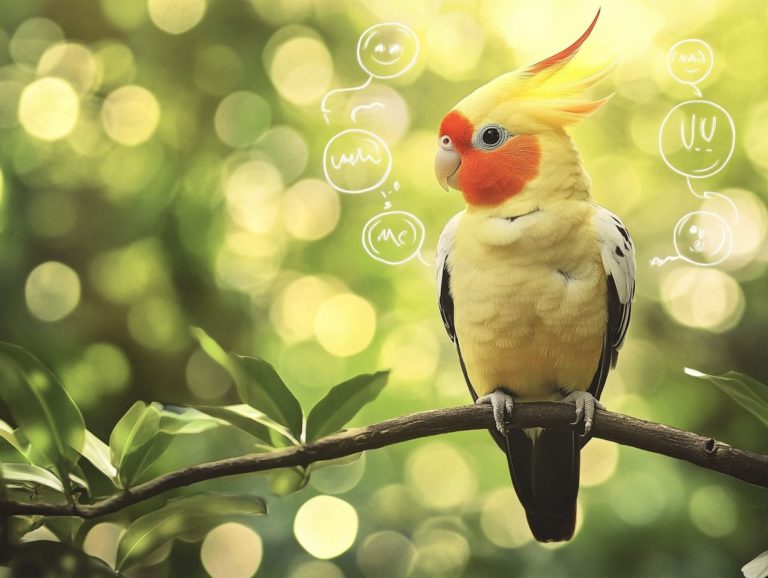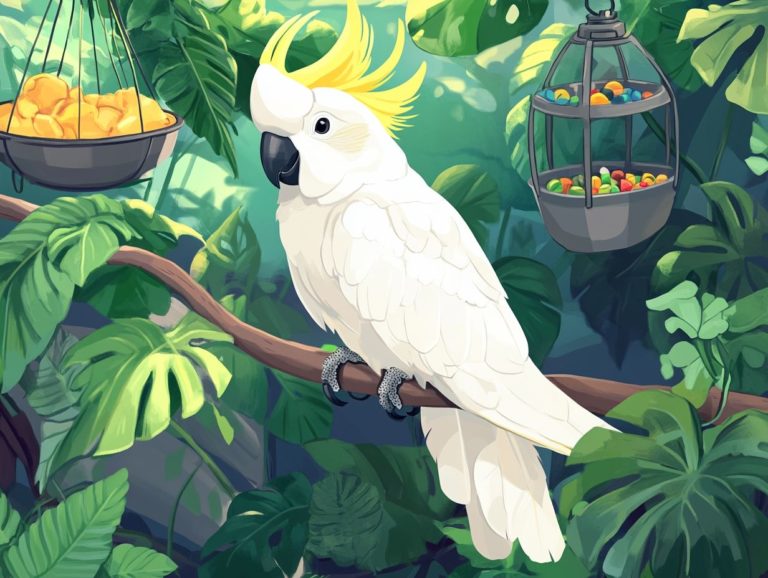5 Tips for Caring for Your First Cockatiel
Bringing a cockatiel into your home promises to be an exciting and rewarding journey! These delightful birds thrive on proper care. This care begins with selecting the right cage and understanding their unique dietary needs.
To help you provide a loving and healthy environment for your new feathered friend, here are five essential tips for cockatiel care!
First, let s tackle the common pitfalls that many first-time owners encounter. We ll explore how to ensure your cockatiel remains both happy and healthy.
Whether you re a seasoned pet owner or stepping into this world for the first time, these insights will guide you in nurturing your cockatiel companion with confidence and care!
Contents
- Key Takeaways:
- 1. Choosing the Right Cage
- 2. Providing a Balanced Diet
- 3. Creating a Safe and Stimulating Environment
- 4. Bonding and Training
- 5. Regular Vet Visits and Health Checks
- Is a Cockatiel the Right Pet for You?
- Frequently Asked Questions
- What are the top 5 tips for caring for your first cockatiel?
- How important is it to provide a spacious and stimulating environment for my cockatiel?
- What should I feed my cockatiel to keep it healthy?
- How can I bond with my cockatiel?
- Do cockatiels need to see a veterinarian regularly?
- How can I maintain a clean and hygienic living space for my cockatiel?
Key Takeaways:
- Choose a spacious, sturdy cage with proper bar spacing for your cockatiel!
- Provide a well-balanced diet with pellets, fresh fruits and vegetables, and occasional treats!
- Keep your cockatiel mentally and physically stimulated with perches and toys, plus time outside of the cage!
1. Choosing the Right Cage
Selecting the right cage for your cockatiel is essential for its well-being. A properly sized and equipped cage greatly influences its overall health and happiness!
This safe haven allows your pet bird to thrive in an environment resembling its natural habitat. Understanding the specific needs of cockatiels, such as cage dimensions and safe cleaning agents, is crucial.
Regular cleaning is vital to minimize the risk of infections. Using bird-safe cleaning products helps maintain a hygienic environment! Avoid harsh cleaning agents that could harm your pet.
An adequately sized cage not only helps prevent behavioral issues, like excessive screaming or feather plucking, but also supports physical health by providing space for movement and exercise.
Providing a variety of safe toys that encourage exercise and mental stimulation is equally important. These toys can significantly enhance your cockatiel’s overall well-being and happiness!
2. Providing a Balanced Diet
A balanced diet is vital for keeping your cockatiel happy and healthy! It plays a crucial role in preventing common health issues.
Incorporating a variety of foods is key. Start with high-quality commercial bird seed as the foundation of their diet. This offers essential fats and proteins.
However, don t stop there! Fresh fruits and vegetables are just as important. They provide crucial vitamins and minerals that support your cockatiel s health. Leafy greens like kale and romaine should be introduced regularly!
Watch for any signs of dietary deficiencies. Regular check-ups with a veterinarian will help you monitor their nutritional intake and adjust the diet based on your cockatiel’s unique requirements!
3. Creating a Safe and Stimulating Environment
Creating a safe and stimulating environment for your cockatiel is essential! This not only shields it from potential hazards but enhances its mental and physical well-being.
Investing in birdproofing your space significantly reduces risks from open windows, dangling cords, and toxic plants. Prioritize safe cleaning agents that won t jeopardize your pet s health!
Offering a variety of perches and a selection of toys can greatly stimulate natural behaviors. These encourage play, exploration, and exercise!
Are you ready to share your cockatiel’s daily escapades on social media? Capturing those playful moments creates cherished memories and fosters a community of fellow bird enthusiasts!
4. Bonding and Training
Bonding and training your cockatiel is a truly rewarding journey that deepens your interactive relationship while ensuring your feathered friend stays mentally stimulated and socially engaged. Regular vet visits can help monitor their progress.
Establishing a strong connection with your cockatiel involves various techniques that cater to their natural instincts and playful nature. Positive reinforcement is key; reward desirable behaviors with treats or praise, and you encourage your bird to engage more actively in your shared activities.
Pay attention to any changes in behavior. This insight helps you understand their emotional needs, ensuring they feel secure and loved. Regular training sessions not only keep your cockatiel healthy but also foster essential social interactions.
Let s not forget the joy of documenting these moments on social media it’s a fantastic way to track progress and share your journey with fellow bird enthusiasts, creating a supportive community along the way.
5. Regular Vet Visits and Health Checks
Regular vet visits and health checks are essential for maintaining your cockatiel’s well-being. These appointments play a crucial role in the early detection of common health issues, ensuring your pet receives the proper care it deserves throughout its life.
During these routine checks, your vet will assess your bird’s overall health monitoring its weight, examining feathers and skin, and looking for any signs of distress or illness. This is also an excellent opportunity to receive guidance on diet, housing, and socialization, all vital for your cockatiel’s happiness.
Stay vigilant for issues like feather plucking or egg binding (a condition where a female bird has difficulty laying eggs), as these can signal stress or health complications. Keeping a health journal can be incredibly useful, allowing you to track changes in behavior or diet, making it easier to communicate any concerns with the veterinarian.
Regular visits safeguard your cockatiel’s physical health and contribute to fostering a long and joyful life for your feathered companion.
Is a Cockatiel the Right Pet for You?
Determining whether a cockatiel is the right pet for you means understanding their unique needs, characteristics, and the commitment required to care for them, especially as exotic pets.
These delightful birds captivate with their playful personalities and striking plumage, but understanding their high social needs is essential for a happy pet! Unlike some pets that can thrive on minimal interaction, cockatiels demand regular socialization and mental stimulation to stay happy and healthy. For those considering adoption, following the essential care guidelines for adopted cockatoos involves dedicating time each day to bond with them through talking, singing, or engaging in simple play.
Given their interactive nature, evaluate your lifestyle carefully before bringing a cockatiel into your home. Ensure you can nurture a dynamic relationship that meets the needs of these affectionate companions, creating an environment where they can truly flourish.
What Are the Basic Needs of a Cockatiel?
- Proper food and water
- Clean cage
- Regular vet check-ups
Understanding the basic needs of a cockatiel is crucial for ensuring its happiness and health. This includes providing proper food and water, maintaining a clean cage, and considering tips for bird care in small apartments to create a suitable environment, as well as scheduling regular vet check-ups.
To meet these needs, offer a balanced diet that features a mix of seeds, fruits, and vegetables, while ensuring fresh water is always at hand. Keeping the cage clean is essential, committing to daily spot cleaning and regular deep cleans to prevent grime buildup and create a healthy living environment.
Monitor health through routine vet visits to catch potential issues early, ensuring your cockatiel thrives. To further enhance their well-being, consider implementing tips for training older birds, enriching its habitat with toys, plenty of perches, and fostering social interaction to help these spirited birds flourish both physically and emotionally.
Don t wait schedule your next vet appointment today to keep your cockatiel happy and healthy!
What Are the Common Mistakes First-Time Cockatiel Owners Make?
First-time cockatiel owners often stumble into a few common pitfalls that could seriously impact their pet’s health and well-being. These issues range from improper feeding to overlooking regular vet visits and not recognizing behavior changes. For those considering expanding their knowledge, a quick guide on caring for your lovebird can provide valuable insights.
One critical misstep is providing a diet that lacks important nutrients. This can lead to deficiencies that affect your bird s vitality and plumage. A balanced diet includes high-quality pellets, fresh fruits, and leafy greens. Avoid excessive seeds; they can lead to obesity.
Social interaction is vital. Neglecting this aspect can result in anxiety and behavior problems for your cockatiel. Make it a priority to spend quality time with your feathered friend each day.
Maintaining a clean living environment is non-negotiable. Regularly cleaning the cage minimizes the risk of infections and keeps your bird happy.
Scheduling regular vet check-ups offers valuable insights into dietary adjustments and behavior tips. This ensures your cockatiel thrives and remains cheerful.
How Can You Tell If Your Cockatiel is Happy and Healthy?
Recognizing the signs of a happy and healthy cockatiel is essential for you as an owner. Any behavioral changes might hint at underlying health issues that require immediate attention.
When your cockatiel is vocal, it often signifies contentment. These delightful birds naturally chirp and sing when they’re in good spirits. You’ll notice their active behavior, like flapping their wings, climbing around their cage, and engaging with toys. All these actions showcase their energy levels and social engagement.
Preening is another important indicator. A happy cockatiel will regularly groom its feathers, keeping them clean and comfortable. Watch for signs of distress, like feather plucking or lethargy, as these could suggest emotional or physical troubles.
If you notice any behavioral shifts, consulting a veterinarian is imperative. They can offer advice on stress relief strategies and recommend an appropriate diet to promote your cockatiel’s well-being.
What Are Some Common Health Issues in Cockatiels?
Cockatiels are vulnerable to various health issues, like feather plucking, egg binding, and psittacosis. As a cockatiel owner, knowing these conditions is key to keeping your bird healthy and happy.
Feather plucking, often triggered by stress or boredom, shows up as patches of bare skin. It can lead to serious skin infections. Look for behavioral changes that indicate distress and provide enrichment through toys and social interaction to help alleviate this problem.
Egg binding occurs when a female bird struggles to lay her eggs. Symptoms include straining and lethargy this situation requires immediate veterinary attention.
Psittacosis, a type of bird disease, can manifest as respiratory distress, lethargy, and diarrhea. Keeping a watchful eye for these symptoms is vital.
Regular health check-ups and maintaining a clean environment will help you catch any issues early. This allows you to explore effective treatment options, ensuring your charming feathered friend enjoys a happy and healthy life.
How Can You Help Your Cockatiel Adjust to Its New Home?
Helping your cockatiel adjust to its new home is essential for its overall well-being. For tips on how to do this, consider these 5 ways to make your adopted bird feel at home. A smooth transition fosters a lasting interactive relationship and prevents stress-related health issues.
To facilitate this adjustment, creating a familiar environment is crucial. Incorporate items from its previous setting to offer comforting reminders of the past. Gradually introduce toys to spark curiosity, allowing your bird to explore its new space at its own pace. Additionally, following the top 10 tips for bird cage setup can help create a comfortable home. Maintaining consistent routines around feeding, playtime, and bedtime establishes a sense of security that your cockatiel will appreciate.
During this period, keep a close eye on its health. Watch for signs of stress, such as excessive vocalization, fluffed feathers, or changes in appetite. Consulting a veterinarian for tailored advice on health needs can significantly enhance this transition experience.
Frequently Asked Questions
What are the top 5 tips for caring for your first cockatiel?
1. Provide a spacious and stimulating environment to keep your cockatiel happy and active!
2. Offer a balanced diet with seeds, pellets, and fresh fruits and vegetables.
3. Spend quality time bonding and training to build trust and avoid issues.
4. Visit a veterinarian at least once a year for check-ups.
5. Keep their living space clean to prevent diseases.
How important is it to provide a spacious and stimulating environment for my cockatiel?
Cockatiels are active and curious birds that need enough space and things to do to thrive. A cage that is too small can lead to boredom and problems. Aim for a cage that is at least 24 inches wide, 24 inches deep, and 24 inches tall for one cockatiel.
What should I feed my cockatiel to keep it healthy?
A balanced diet for a cockatiel includes high-quality seeds, pellets, and fresh fruits and vegetables. Avoid foods that are high in fat, sugar, or salt. Always provide clean and fresh water.
How can I bond with my cockatiel?
Spending quality time with your cockatiel is key to building a strong bond! Talk to them, offer treats, and play games. Be patient and consistent in your interactions, and your cockatiel will learn to trust and love you.
Do cockatiels need to see a veterinarian regularly?
Yes, it is important to take your cockatiel to a veterinarian at least once a year for a check-up. If you notice any changes in their behavior or health, seek help right away!
How can I maintain a clean and hygienic living space for my cockatiel?
Regularly clean your cockatiel’s cage, perches, and toys to prevent the spread of diseases. Use a pet-safe cleaner and change their food and water dishes daily. Always wash your hands before and after handling your cockatiel to minimize germs.

